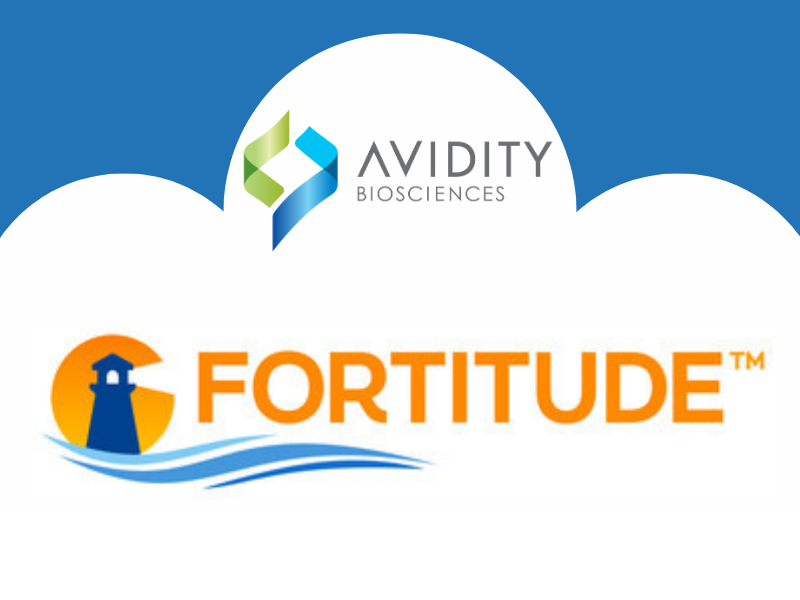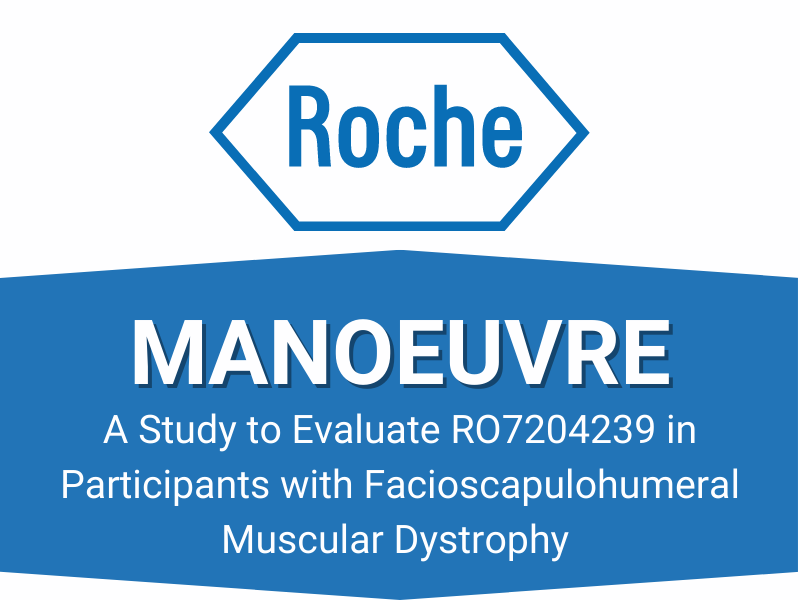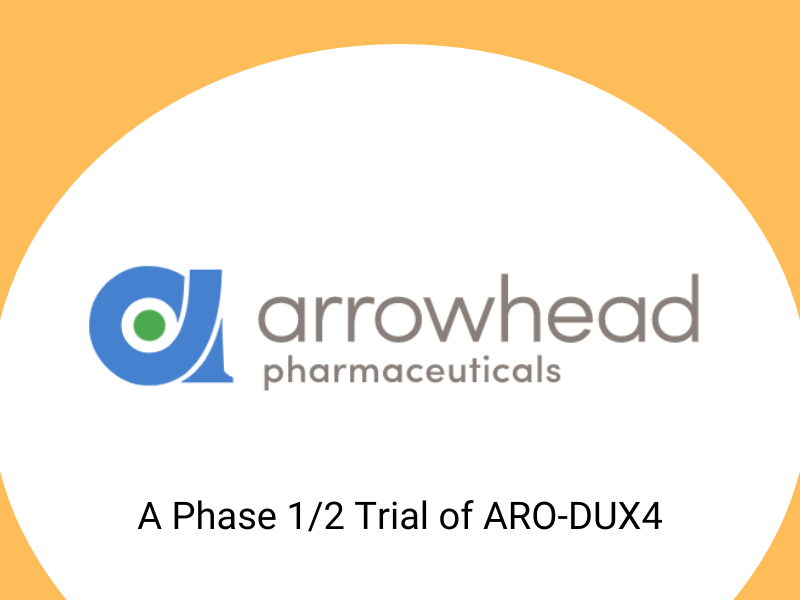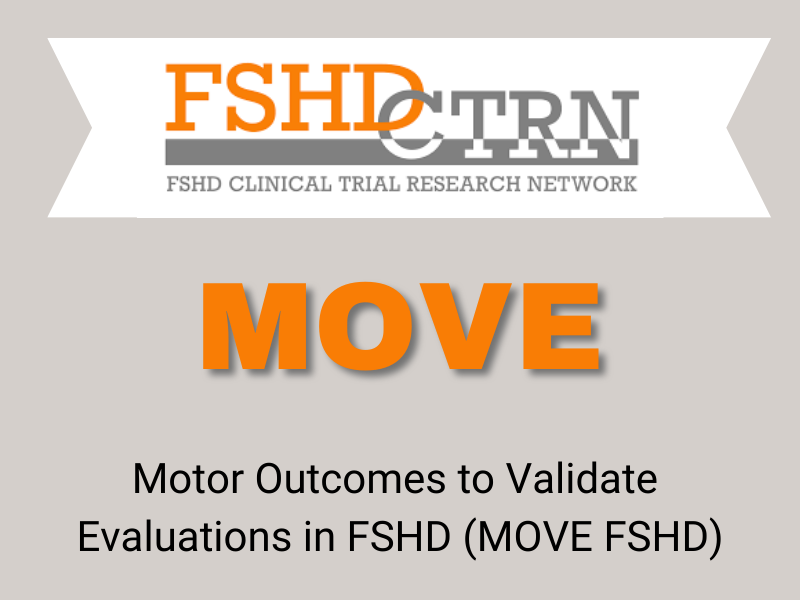Join BetterLife FSHD Today!
Participate in a Clinical Study or Trial

Clinical studies are a type of research involving human volunteers. Clinical trials are a type of clinical study to test whether a treatment works. The National Institutes of Health website ClinicalTrials.gov provides free access to information on clinical studies and trials. We list below key FSHD studies and trials, including some that are not in clinicaltrials.gov.
If you see a study that you are interested in, you can contact the study coordinator listed on the page and ask for details about enrolling.
Get the latest news and trial alerts
Key Studies
Additional studies
This is also a very important research study serving the entire community. All patients are encouraged to join it. There is a need for younger, more mildly affected volunteers.
Established with funding from the U.S. National Institutes of Health (NIH), the registry is a database of U.S. patients diagnosed with DM or FSHD who are interested in participating in research about these diseases. Their unaffected family members are also invited to join. The National Registry assists researchers looking for volunteers to participate in their studies by searching the registry database for qualified members. The registry staff sends those members a letter announcing the project. Applications are accepted from members and researchers across the United States. To enroll, people are required to complete a comprehensive questionnaire.
If you would like to participate or have questions, please contact: Leann Lewis, MS Health Project Coordinator at the University of Rochester Medical Center/Fields Center/Neuromuscular Disease Center Phone: 585-275-7680 Email: leann_lewis@urmc.rochester.edu The National Registry of Myotonic Dystrophy and FSHD 601 Elmwood Avenue, Box 673 Rochester, NY 14642-8673 USA Toll free: (888) 925-4302 (9 a.m. to 4 p.m. weekdays, EST); Local (Rochester, NY): (585) 276-0004 Fax: (585) 273-1255; Email: dystrophy_registry@urmc.rochester.edu; Web: http://www.dystrophyregistry.org
This clinical trial led by Dr. Sabrina Sacconi is based on research showing that the inflammatory molecule, interleukin-6 (IL-6), is abnormally high in people with FSHD. She hypothesizes that IL-6 contributes to inflammation and muscle damage in the disease. Satralizumab is a repurposed drug used in the treatment of neuromyelitis optica spectrum disorder, a rare autoimmune disease. It is an antibody blocking the IL-6 receptor.
This clinical trial will evaluate whether satralizumab is safe and can improve clinical outcomes in people with FSHD1. For more information, visit clinicaltrials.gov. The trial involves 40 participants and is located in Nice, France, and Ottawa, Canada.
Dietary Protein Requirements in Adults with Facioscapulohumeral Muscular Dystrophy, Montreal, Canada
Study Overview: The objective of our study is to recruit 8-10 participants (4-5 males and 4-5 females) aged 26-55 years. Currently, little is known about the dietary protein requirements in individuals with FSHD. Considering the impact of FSHD on muscle mass, muscle quality, and physical activity, protein needs may significantly differ from those of age-matched healthy individuals. Our goal is to determine whole-body dietary protein requirements in adults with FSHD, addressing a critical gap in the literature. Establishing these requirements could enhance clinical care by providing tailored nutritional strategies to mitigate muscle atrophy, improve quality of life, and promote functional independence.
IRB approval: The study has been approved by the Institutional Review Board (IRB) of the Faculty of Medicine and Health Sciences at McGill University (Study Number: A06-m33-23b (23-04-062)). Submission to ClinicalTrials.gov was completed on January 16th, 2025.
Recruitment period: Recruitment is anticipated to begin on January 20th, 2025, with an anticipated study completion date of March 2026.
Geographic Location: We aim to recruit participants residing in Québec who can travel to Montreal, specifically to McGill University.
Inclusion criteria:
- Aged 26-55 years
- Genetically confirmed diagnosis with FSHD
- Stable medication, dietary, and lifestyle habits for at least three months prior to screening visit.
Exclusion Criteria:
- Diagnosed with type 1 or type 2 diabetes mellitus
- Actively taking sympathomimetic agents, antidepressants, or beta-receptor blockers (subject to revision based on recruitment feasibility).
Study Coordinator: Arianne Zabbal
Email address: arianne.zabbal@mail.mcgill.ca
LINKS TO (SEE ATTACHED)
This international organization for neuromuscular disease maintains a network of FSHD registries.
The purpose of the study is to evaluate new ways to diagnose neuromuscular diseases. Neuromuscular diseases (NMDs) can affect the nerves that control the muscles you move voluntarily or the muscles themselves. The techniques used in this research are experimental, and have not been approved by the FDA or any other health authority. This research will evaluate the validity of new neuromuscular disease testing, and could identify new neuromuscular disease genes. You will be asked to provide a saliva sample. We will then collect the DNA from the sample (DNA stands for deoxyribonucleic acid. It is the genetic code of organisms). The DNA will be sequenced and checked for any changes or mutations. In addition, the DNA will be checked for epigenetic changes.
If you are interested in learning more, please contact Peter Jones.
Physicians and researchers at the University of Massachusetts Chan Medical School (UMass Chan) seek individuals with facioscapulohumeral muscular dystrophy (FSHD) to participate in an FSHD Biomarker Study. This will be conducted by Dr. Lawrence J. Hayward, M.D., Ph.D. This study focuses on explaining the variability of FSHD, especially within the same families, through examination of both genetics and other biomarkers.
Purpose:
The purpose of this study is to identify and understand genes that may explain why people with FSHD have different amounts of weakness in different muscles (different phenotypes). We also aim to identify biological markers and functional measurements that will enable us to follow and predict disease progression or indicate possible responses to treatment in upcoming FSHD clinical trials.
Participation:
Blood, saliva, muscle and/or skin samples from individuals with FSHD, some family members, and population controls are being accepted for this research study. Participants will be asked to complete a brief medical/family history questionnaire. Also, the clinicians will ask for permission to review the medical records of those with FSHD to understand the onset and progression of their disease.
The University of Massachusetts Chan Medical School will cover costs of the sample collection for participation, except for travel and housing. We are happy to help to make arrangements for the blood and saliva samples to be collected locally.
UMass Chan Wellstone Center for FSHD:
This study is a component of the Senator Paul D. Wellstone Cooperative Research Center for FSHD, sponsored by the National Institutes of Health. The overriding goal of the Center is to develop innovative therapies for FSHD. Research projects are conducted by an experienced team of collaborative investigators led by Charles P. Emerson, Ph.D. (UMass Chan), Louis Kunkel, Ph.D. (Children’s Hospital of Boston), and Kathryn Wagner, M.D., Ph.D. (Kennedy Krieger Institute at Johns Hopkins School of Medicine). The Center also provides outreach to academic and industry partners and to patient advocacy groups such as the FSH Society to share research materials and to connect with individuals affected by FSHD.
Further information about the Center: https://www.umassmed.edu/wellstone/
Benefits:
Although there are no direct benefits for those involved in this research, we are hopeful that understanding FSHD will lead to more effective screening, diagnosis, treatments, and ultimately a cure for this disease.
We greatly look forward to speaking with you to answer any questions you may have and to describe this study in more detail.
For more information, please contact:
Catherine Douthwright, PhD
Neurology Research Coordinator
Phone: 508-856-1524
Email: catherine.douthwright@umassmed.edu
UMass Chan Medical School
55 Lake Ave. North
Worcester, MA 01655
Fax: (508) 856-4485
The clinical diagnosis of Facio-Scapulo-Humeral Muscular Dystrophy (FSHMD) requires the movement of patients to a medical centre and a lengthy examination involving medical personnel, and may be underestimated in the most moderate cases. Thus, it requires costly and burdensome logistics both for patients living in remote areas and having to undertake long and expensive travel, and for clinical staff. This is an obstacle to large-scale diagnosis. The investigators plan to alleviate these limitations through the use of digital facial analysis technology that would enable large-scale diagnosis of patients through telemedicine.
For more information visit clinicaltrials.gov.
To analyze the natural history data, clinical spectrum, genetic features, sepigenetic features, and genotype-phenotype correlations for facioscapulohumeral muscular dystrophy (FSHD), and to optimize clinical management.
Read more here.
Tissue donated by FSHD patients is essential for new discoveries that can lead to treatments, and, eventually, to a cure. Please consider the valuable gift to research of tissue donation obtained during certain types of surgery (such as scapular fixation) or at death.
This is a contact registry for individuals who would like to be notified when UC Davis needs patient volunteers for studies in neuromuscular disease. To sign up, visit their website.
The Stanford Neuromuscular Recruitment Database is used to recruit people to their upcoming research studies, drug trials, and conferences. If you would like to enroll, visit the Recruitment Database website.
This is a study designed to determine if clenbuterol is a treatment option for FSHD. The study will look at the safety and tolerabiity of 3 doses of the drug given over 6 months. It is an open-label study with no placebo arm. It will be conducted at three locations in the U.S.: Rochester, NY, Kansas City, Kansas, and Seattle, WA.
Read the Target FSHD Study Fact Sheet.
See more at ClinicalTrials.gov: https://clinicaltrials.gov/study/NCT06721299
This is a patient volunteer recruitment registry for Chinese clinical trials in FSHD. It is managed by Fujian Medical University. For more information, visit their website.





